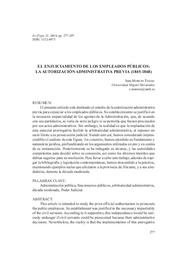Por favor, use este identificador para citar o enlazar este ítem:
https://hdl.handle.net/11000/34835Registro completo de metadatos
| Campo DC | Valor | Lengua/Idioma |
|---|---|---|
| dc.contributor.author | MORENO TEJADA, SARA | - |
| dc.contributor.other | Departamentos de la UMH::Ciencia Jurídica | es_ES |
| dc.date.accessioned | 2025-01-17T10:12:33Z | - |
| dc.date.available | 2025-01-17T10:12:33Z | - |
| dc.date.created | 2018 | - |
| dc.identifier.citation | Ius Fugit. Revista de Cultura Jurídica | es_ES |
| dc.identifier.issn | 1132-8975 | - |
| dc.identifier.uri | https://hdl.handle.net/11000/34835 | - |
| dc.description.abstract | El presente artículo está destinado al estudio de la autorización administrativa previa para enjuiciar a los empleados públicos. Su establecimiento se justificó en la necesaria imparcialidad de los agentes de la Administración, que, de acuerdo con sus partidarios, se vería en serio peligro si se permitía que fuesen procesados por sus actos administrativos. Sin embargo, la realidad es que la implantación de esta especial prerrogativa facilitó la arbitrariedad administrativa, al suponer un serio límite a su persecución judicial. Siendo esto así, hemos considerado imprescindible el análisis de esta figura. En concreto, hemos atendido su fundamento y naturaleza jurídica, profundizando en los argumentos utilizados en pro y en contra de su instauración. Posteriormente se ha indagado su alcance, y las autoridades competentes para decidir sobre su concesión, así como los diversos trámites que debían seguirse para su resolución. Para llevar a cabo este trabajo, además de espigar la bibliografía y legislación contemporáneas, hemos descendido a la práctica, examinando ejemplos reales que afectaron a la provincia de Alicante, y a sus alrededores, durante la década moderada. | es_ES |
| dc.description.abstract | This article is intended to study the prior official authorisation to prosecute the public employees. Its establishment was justified in the necessary impartiality of the civil servants. According to it supporters, this independence would be seriously endanger if civil servants could be prosecuted because their administrative decisions. Nevertheless, the reality is that the implementation of this prerogative allowed the administrative arbitrariness, because it involved a big limit to its prosecution. This being so, we believe it is essential to analyze this figure. In particular, we have attended carefully to its fundaments and legal nature, deepening in the arguments for and against of its establishment. After that we have also studied its scope of application, and the competent authorities to resolve, as well as the procedure for it resolution. For taking this work forward, as well as study the bibliography and legislation, we have descended to the practice, analysing specific examples wich affected to the Alicante province and surroundings during the Moderate period. | es_ES |
| dc.format | application/pdf | es_ES |
| dc.format.extent | 21 | es_ES |
| dc.language.iso | spa | es_ES |
| dc.publisher | Institución Fernando el Católico | es_ES |
| dc.relation.ispartofseries | 21 | es_ES |
| dc.rights | info:eu-repo/semantics/openAccess | es_ES |
| dc.rights | Attribution-NonCommercial-NoDerivatives 4.0 Internacional | * |
| dc.rights.uri | http://creativecommons.org/licenses/by-nc-nd/4.0/ | * |
| dc.subject | Administración pública | es_ES |
| dc.subject | Funcionarios públicos | es_ES |
| dc.subject | Arbitrariedad administrativa | es_ES |
| dc.subject | Década moderada | es_ES |
| dc.subject | Poder judicial | es_ES |
| dc.subject | Public administration | es_ES |
| dc.subject | Civil servant | es_ES |
| dc.subject | Administrative arbitrariness | es_ES |
| dc.subject | Moderate period | es_ES |
| dc.subject | Judicial power | es_ES |
| dc.subject.other | CDU::3 - Ciencias sociales::34 - Derecho | es_ES |
| dc.title | El enjuiciamiento de los empleados públicos: la autorización administrativa previa (1845-1868) | es_ES |
| dc.type | info:eu-repo/semantics/article | es_ES |

Ver/Abrir:
4. IUS FUGIT EL ENJUICIAMIENTO DE LOS EMPLEADOS PÚBLICOS.pdf
109,52 kB
Adobe PDF
Compartir:
 La licencia se describe como: Atribución-NonComercial-NoDerivada 4.0 Internacional.
La licencia se describe como: Atribución-NonComercial-NoDerivada 4.0 Internacional.
.png)